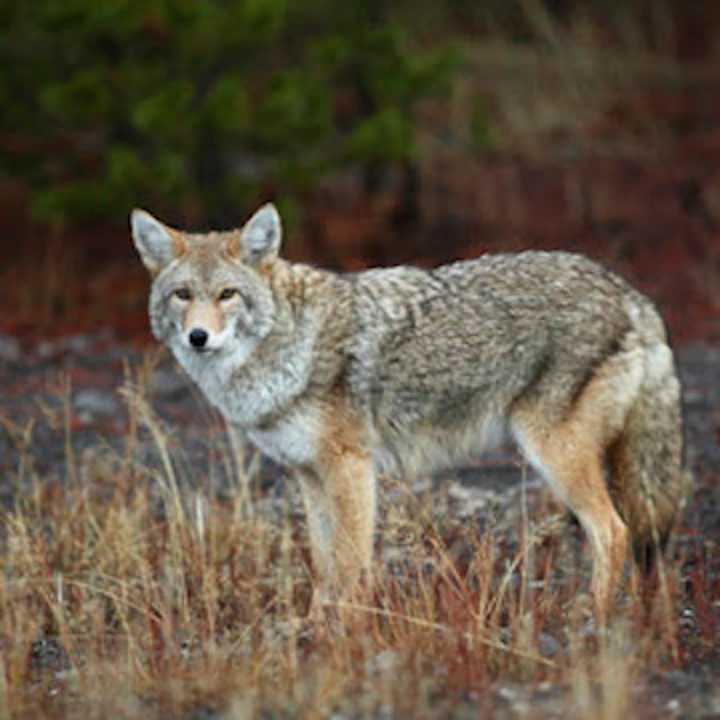The coyote is a wild member of the dog family and closely resembles a small German shepherd with the exception of its long snout and bushy, black-tipped tail.
Another key difference from a domestic dog is readily noticeable even from a distance: The coyote has a habit of holding its tail below a horizontal position while standing, walking and running.
Eastern coyotes differ from their western counterparts with a larger average size and various color phases, including blonde, red and black. Past interbreeding between wolves and coyotes may be responsible for the larger size and color variations in our eastern coyote.
In New Jersey, adult coyotes range in weight from 20-50 pounds and exceptionally large ones may be up to 55 pounds. Coyotes adjust well to their surroundings and can survive on whatever food is available.
They prey on rabbits, mice, birds and other small animals, as well as young and weakened deer. They also consume carrion (decaying tissue). They are tolerant of human activities and rapidly adapt to changes in their environment.
Coyotes bear litters during April and May, with females delivering between three and nine pups. Conflicts between coyotes and humans are most likely to develop as adults forage for food for the pups in the spring and summer.
Coyotes primarily hunt rodents and rabbits for food, but will take advantage of whatever is available, including garbage, pet food and domestic animals that are left unattended.
Allowing coyotes access to human food and garbage is irresponsible and can lead to problems. Coyotes, along with foxes, are sometimes afflicted with mange which can result in significant hair loss. The loss of fur can result in making identification of a coyote difficult, resulting in reports of a "mystery" animal, or even a cougar.
In suburban and urban areas, coyotes have occasionally attacked small pets. Although attacks on humans are extremely rare in eastern states, as with any predatory animal they can occur.
Coyotes play an important role in the ecosystem, helping to keep rodent populations under control. They are by nature wary of humans. However, coyote behavior changes if given access to human food and garbage. They lose caution and fear.
They may cause property damage and threaten human safety, requiring euthanasia. Relocating a problem coyote is not an option because it only moves the problem to someone else's neighborhood.
Coyote Precautions:
The following guidelines can help reduce the likelihood of conflicts with coyotes, according to the State of New Jersey Division of Fish & Wildlife:
- Never feed a coyote. Deliberately feeding coyotes puts pets and other residents in the neighborhood at risk;
- Feeding pet cats and/or feral (wild) cats outdoors can attract coyotes. The coyotes feed on the pet food and also prey upon the cats;
- Put garbage in tightly closed containers that cannot be tipped over;
- Remove sources of water, especially in dry climates;
- Bring pets in at night;
- Put away bird feeders at night to avoid attracting rodents and other coyote prey;
- Provide secure enclosures for rabbits, poultry, and other farm animals;
- Pick up fallen fruit and cover compost piles;
- Although extremely rare, coyotes have been known to attack humans. Parents should monitor their children, even in familiar surroundings, such as backyards;
- Install motion-sensitive lighting around the house;
- Clear brush and dense weeds from around dwellings – this reduces protective cover for coyotes and makes the area less attractive to rodents and rabbits. Coyotes, as well as other predators, are attracted to areas where rodents are concentrated like woodpiles;
- If coyotes are present, make sure they know they’re not welcome. Make loud noises, blast a canned air siren, throw rocks, or spray them with a garden hose.
If you observe coyotes in the daytime that show no fear of humans or if a coyote attacks a person, immediately contact local police and the Division of Fish and Wildlife at (908) 735- 8793. Outside of normal business hours call the DEP Hotline at 877-WARN-DEP.
Call your local police department if you see a wild animal that is acting sick or showing abnormal behaviors, such as partial paralysis, staggering as if drunk or disoriented, circling or self-mutilating.
Adults must be able to report the location and description of the animal. If the animal is a pet, officials need the owner’s name, address, and telephone number, the animal’s vaccination status, and its licensing number/identification.
For further information, contact the Bergen County Department of Health at (201) 634- 2600 or www.bergenhealth.org.
Click here to follow Daily Voice Lyndhurst and receive free news updates.
